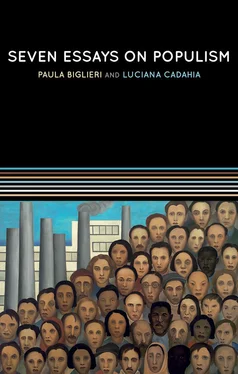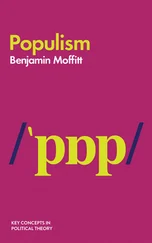Title: Seven essays on populism : for a renewed theoretical perspective / Paula Biglieri and Luciana Cadahia ; translated by George Ciccariello-Maher.
Description: English Edition. | Medford : Polity Press, 2021. | Series: Critical South | Includes bibliographical references and index. | Summary: “A critical exploration of the meaning and potential of populism in contemporary political thought”-- Provided by publisher.
Identifiers: LCCN 2020027959 (print) | LCCN 2020027960 (ebook) | ISBN 9781509542208 (Hardback) | ISBN 9781509542215 (Paperback) | ISBN 9781509542222 (ePub) | ISBN 9781509547029 (Adobe PDF)
Subjects: LCSH: Populism.
Classification: LCC JC423 .B53 2021 (print) | LCC JC423 (ebook) | DDC 320.56/62--dc23
LC record available at https://lccn.loc.gov/2020027959
LC ebook record available at https://lccn.loc.gov/2020027960
by Fakenham Prepress Solutions, Fakenham, Norfolk NR21 8NL
The publisher has used its best endeavors to ensure that the URLs for external websites referred to in this book are correct and active at the time of going to press. However, the publisher has no responsibility for the websites and can make no guarantee that a site will remain live or that the content is or will remain appropriate.
Every effort has been made to trace all copyright holders, but if any have been overlooked the publisher will be pleased to include any necessary credits in any subsequent reprint or edition.
For further information on Polity, visit our website: politybooks.com
Tarsila do Amaral (1886–1973) is one of the most prominent representatives of Latin American modernism and one of the most renowned artists in Brazil. Her work Abaporu , 1928, inspired the Anthropophagic Movement in the plastic arts. To learn more: www.tarsiladoamaral.com.br.
Her work Operários , 1933, is featured on the cover of this book and was created during the social phase of the artist’s work, after she returned from Russia.
Stand up, you who know how to feel and do not suffer the painful frigidity of academics.
Jorge Eliécer Gaitán
Democracies are generally thought to die at the barrel of a gun, in coups and revolutions. These days, however, they are more likely to be strangled slowly in the name of the people.
The Economist , August 2019
... leftist populism is a profound error. It has no chance of matching the populist appeal of the right, and it dangerously validates some of the right’s arguments.
Tony Blair, The New York Times , March 2017
There can no longer be any doubt that we are going through a populist moment. The question is whether this populist moment will turn into a populist age – and cast the very survival of liberal democracy in doubt.
Yascha Mounk, The Guardian , March 2018
The People vs. Democracy
Title of Yascha Mounk’s 2018 book
When populists distinguish between the “people” and the “elite,” they depict each of these groups as homogeneous. Populism is the enemy of pluralism, and thus of modern democracy.
William Galston, “The Populist Challenge to Liberal Democracy” 1
Mainstream political discourse today, both scholarly and journalistic, equates populism with hard-right mobilizations animated by zealous passion born of resentment and led by irresponsible demagogues. Populism is presumed anti-liberal in every sense of the word, as well as disdainful of Constitutionalism, universalism, limited state power, and democratic institutions. The discourse also holds populism responsible for bringing to power authoritarian, ethno-nationalist regimes around the globe, threatening the disintegration of the European Union and endangering the civilizing and civilized reign of liberal democratic values. It is figured as rightist in essence, or, as the case of Venezuela is believed to demonstrate, as inevitably turning autocratic or despotic. 2It is cast as embodying a simplistic and binaristic worldview, feeding on economic and cultural vulnerability, and rejecting facticity, truth, and expertise, as well as inclusion, pluralism, and tolerance. 3It is ugly to the core.
This vilification of populism is not unique to the present moment. Rather, Biglieri and Cadahia teach us in this rich and erudite work, populism has always been in disrepute. This is true in Europe where right-wing populism requires no modifier, and left or democratic populism are oxymorons. It is true in the United States, notwithstanding its rich history of populist rebellion against control of local and national government by financial elites. It is true in Latin America, where populism is associated with Peronism and socialism, neoliberalism and Chavismo. Populism, Biglieri and Cadahia remind us, has been disparaged by liberals and Marxists, globalists and institutionalists, social engineers and free-marketeers, oligarchic republicans and egalitarian social democrats, colonial managers and their postcolonial elite successors. It has been charged with deviating from true class struggle, symptomizing mal-development or failure to modernize, expressing social-psychic primitivism or regression to the mob, rebelling against democratic constraints and institutions, assaulting liberal universalism and inclusion, abhorring cosmopolitanism and globalism, and rebuffing expert and technical knowledge.
As the malignancies discursively associated with populism proliferate and diversify, how might we read this overdetermined outrage and see what it unwillingly confesses? Perhaps, Biglieri and Cadahia declare, populism’s threatening force carries an emancipatory secret, “the secret of the people” (1). Perhaps the horror of populism carries a horror of the people, especially of a politics of the people, the power of the people, real democracy. This is the suspicion that animates Seven Essays on Populism , a work situated in the history and politics of Latin America but fashioned from a richly international theoretical arsenal. This suspicion fuels the authors’ twofold bid to defend populism against all comers and to address populism’s internal challenges – its potential complicity with neoliberalism, exclusionary nationalisms, authoritarian leaders, mob affect, machismo, and more. Thus, a book that begins by cleaning centuries of mud from its object develops by helping that object meet contemporary political challenges. Biglieri and Cadahia want to redeem populism, to be sure, but also to contribute to its theoretical and political development for 21st-century “militant” left struggles. 4
A theoretical orientation and apparatus are immensely helpful when undertaking a task of this magnitude. Theory helps to parse the sloppy ways the term has been bandied about, and to diagnose the hyperbole and the metonymic slide between its pejorative associations –“the aesthetically ugly, the morally evil, a lack of civic culture, contempt for institutions, [rife with] demagoguery, and irrationality” (4). Theory permits critical analysis of populism’s identification with historical backwardness and “regression,” revealing the conceits of modernity, modernization theory, and Orientalism on which this identification draws (5). Theory permits an exposé of the philosophical premises and political frames of liberal and left critiques of populism. Above all, theory permits Biglieri and Cadahia to formulate what they term the logics – rather than only the empirics – of populism, and thus disrupts the casual epistemological positivism fueling much of its opposition and securing the intellectual confidence of its enemies.
Biglieri and Cadahia are rigorous and imaginative theorists in their own right. They are also dedicated students of philosopher Ernesto Laclau, whom they identify as the first and most important contemporary thinker to lift populism from the dirt and make it central to rethinking the nature of “the political.” Through his own writing and the collaborative academic sites he helped to create in Essex and Buenos Aires, Laclau bore down on the “excess” that populism is always accused of generating to discover logics in that excess that precisely challenge the logics of liberalism and, later, neoliberalism. Populism, Laclau showed, challenges the liberal logics by which citizenship is always imagined individualized, power is imagined appropriately institutionalized, problems are imagined isolated from one another, and democratic popular sovereignty is reduced to voting and representation. Populism contests each of these as it brings into being “the people” in place of the citizen or voter; a “frontier” of contest between the people and the elite in place of isolated social problems; a “populist rupture” in place of referral of problems to institutions; and a counter-hegemonic struggle for a different order in place of popular sovereignty identified with parliamentary democracy.
Читать дальше












